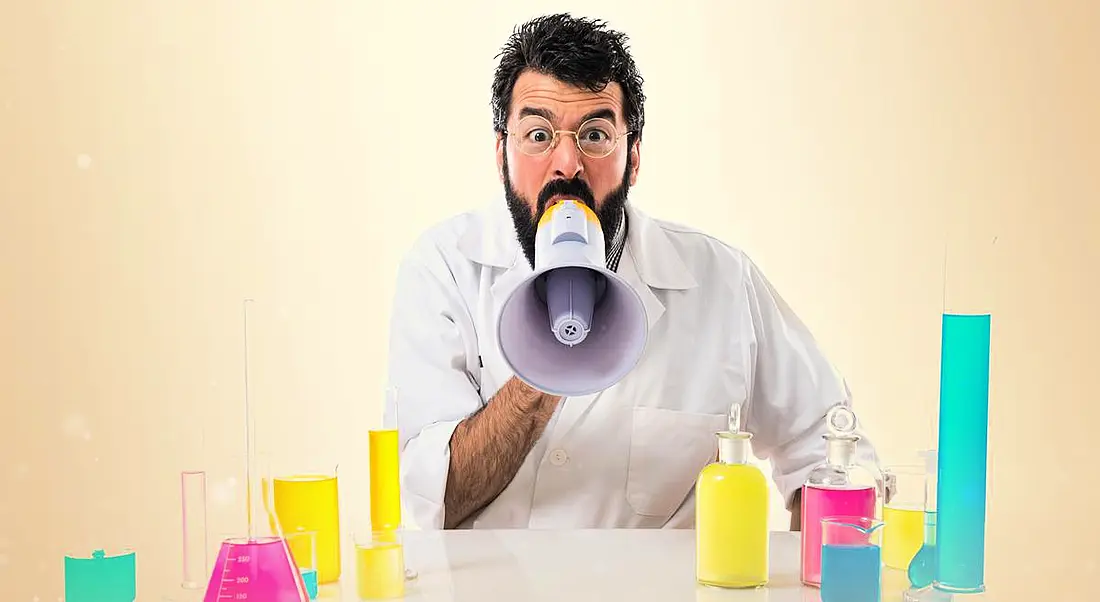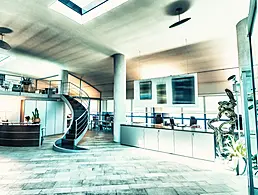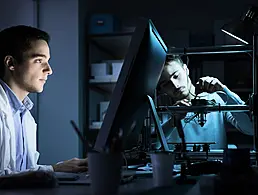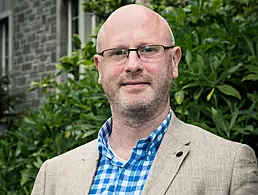It’s one thing to be on the cutting edge of research. But what good is that if you can’t get the right people to listen to you?
Scientists and researchers are amazing. They’re at the forefront of the latest innovations and technology, trying to make every aspect of our lives better.
From clinical trials to eradicating life-threatening diseases to soft robotics that will make physical rehabilitation easier, researchers hold the keys to the future.
However, among the many stumbling blocks and obstacles standing in the way of researchers, one in particular plays a major role.
Communication is an essential part of science and research. Much like the researchers need to get drugs from a lab to the human body, they also need to relate their technical, jargon-filled ideas to the people that need to be interested in them.
The problem is that the people they need to communicate with are not always going to have an understanding that matches theirs. In fact, their understanding of the complexities of a researcher’s work could be the difference between receiving funding and not.
That’s where the Connect To Communicate (C2C) Academy comes in. “Several years ago, myself and Dr Niamh Shaw and other partners developed a communications training programme to use theatre skills to enhance the communication skills for researchers,” said Alexandra Boyd, project manager of public engagement, UCD Research.
The programme was designed to give researchers the confidence to help them communicate with multiple different audiences.
Simplifying the research
“Academics are excellent at communicating with other academics,” said Boyd. “But sometimes, if they’re communicating with the public, there’s a lag in understanding and the complexity of language used.”
Boyd said many researchers feel ill-equipped to communicate with non-experts. “So, we decided that using theatre skills and improvisation would be a really excellent way of training the research community.”
The C2C Academy is supported by Science Foundation Ireland and is collaborating with the Alan Alda Center for Communicating Science.
Dr Laura Lindenfeld, who is the director of the Alda Center, will visit Dublin this week as part of the C2C Academy’s taster event.
Along with Lindenfeld and Shaw, improvisation expert Carol Shindler will work with 20 scientists from around Ireland on their communication skills.
“It’s a taster session that will build interest for our full training programme that will be held in the autumn, where we’ll have a series of workshops that will be available to academics around the country in three different centres,” explained Boyd.
Escaping the curse of knowledge
The Alda Center has trained more than 8,000 scientists and medical professionals around the US, and that number is increasing globally.
Speaking to Siliconrepublic.com, Lindenfeld spoke about what the centre does to help scientists and researchers.
“We use a blend of improvisational theatre techniques and then techniques to help scientists distil their message, tell stories, and convey science in ways that are clear and bold and vivid so that they really land with their audiences.”
As researchers work in extremely complex areas, it can be difficult for them to convey that level of complexity to people who don’t work in those fields. This can be problematic when communication skills have not factored into a scientist’s initial training.
‘It’s so easy to forget what it feels like to not know something’
– DR LAURA LINDENFELD
“One of the things that we really care about at the Alda Center is helping communication to become part of the fundamental thing that you learn to do as a scientist,” said Lindenfeld.
“I think what the improvisation does is, it reminds us to be present in the moment,” she said. “We have to get out of the curse of knowledge that we have in our own heads. It’s so easy to forget what it feels like to not know something.”
Lindenfeld said that improvisational skills remind scientists that other people are not there in their heads with the same knowledge.
“It’s our obligation to try to step into the shoes of other people and understand where they’re coming from to see if the communication lands.”
How to communicate your research
Knowing the pitfalls, what can a researcher do to ensure they’re magically good at communicating?
Lindenfeld said that giving someone a checklist of things – such as make eye contact, smile, listen to questions – is not the answer and won’t necessarily equal good communication. Instead, she simply advised: “Stay fully present with your audience and make sure you stay with them.”
While that might sound easier said than done, Lindenfeld did have one tip: “Try to notice what the other person is wearing, what colour are they wearing? Really look at their face, what colour are their eyes? Take some care, take some real interest in that other person.”
Communication is important in almost every career track and, while it can fall by the wayside for scientists, it is a crucial element of their work. This is especially true for research when it comes to funding.
Scientists often need people, or work with people, who don’t understand the value of what they do, and they may even think it’s not worthwhile.
“There are real serious debates around funding for science, denial of different types of science, and it’s part of what really concerns me,” said Lindenfeld.
When it comes to dealing with these roadblocks, she advised researchers and scientists to listen to that anger or discomfort that people feel and find some value in it.
“Slow down and find some reason to connect,” she said. “You can always think about what they might care about and take that very seriously.”
The C2C Academy’s taster event takes place this Friday, 23 June, and the workshops will follow later on this year.




